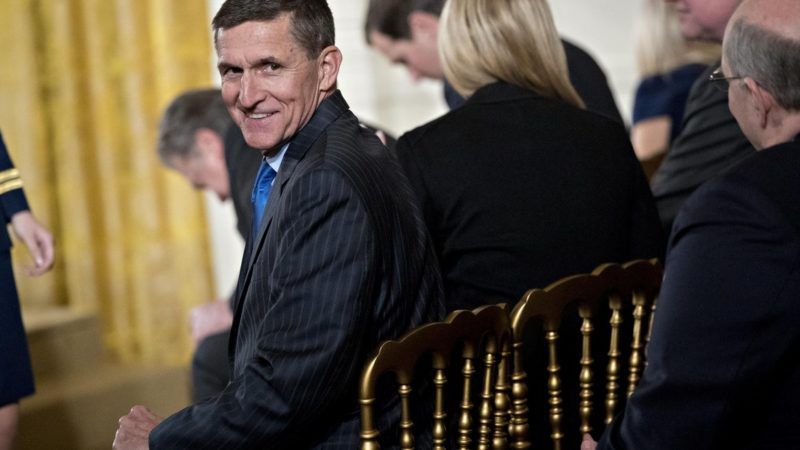Justice Department Moves To Dismiss Charges Against Michael Flynn
Feds now say the national security advisor's lie wasn’t “material” and they cannot prove it.

The Justice Department is moving to drop its case against Michael Flynn, former national security advisor to President Donald Trump. Federal prosecutors charged Flynn with lying to the FBI about his contacts with a Russian ambassador. Flynn confessed to the charges in 2017.
U.S. Attorney Timothy Shea today submitted a motion to the U.S. District Court for the District of Columbia to dismiss charges against Flynn. "Based on an extensive review and careful consideration of the circumstances," the motion reads, "continued prosecution of this case would not serve the interests of justice."
Flynn pleaded guilty to charges that he lied to the FBI about communicating in 2016 with Russian ambassador Sergey Kislyak. This was prior to Trump taking office, and Flynn wanted Russia to moderate its response to sanctions from President Barack Obama's administration. These communications were uncovered during the investigation of Trump's campaign to determine whether he or his staff were being influenced by the Russian government.
Flynn is now trying to retract his guilty plea and get it tossed out. Today's motion is certainly going to bolster his argument.
The motion is 20 pages long and operates on a complex argument that, among other things, Flynn's lie was not a crime because the Justice Department has determined that the counterintelligence investigation against Flynn was itself not justified. The interview did not have a proper basis and was not "conducted with a legitimate investigative basis and therefore [the government] does not believe Mr. Flynn's statements were material even if untrue."
This is an extraordinary argument from the Justice Department. In general, (as Reason has noted previously when writing about the Flynn case) the FBI and Justice Department have very wide latitude under federal statute to determine whether a lie is "material" to an investigation. That Flynn lied about contacts with the Russian government during an investigation by the FBI about possible Russian infiltration or manipulation of the 2016 presidential election would seem, to the average layperson, to be a "material" lie. Indeed, one footnote acknowledges that the court has already deemed Flynn's statements to be "material" to the investigation, but that was before new disclosures about the way the Flynn interviews were being handled.
Shea writes of Flynn's calls to Kislyak: "The calls were entirely appropriate on their face. Mr. Flynn has never disputed that the calls were made. Indeed, Mr. Flynn, as the former Director of Defense Intelligence Agency, would have readily expected that the FBI had known of the calls—and told FBI Deputy Director McCabe as much."
This motion is being perceived as a sign of deep corruption in the Justice Department to protect Trump and people around Trump, because it's extremely unlikely such a motion would happen otherwise. Former federal prosecutor and current defense attorney (and Reason Contributing Editor) Ken "Popehat" White took to Twitter to note that this would never, ever fly for any other defendant:
https://twitter.com/Popehat/status/1258469159119142912
It's right to be deeply critical of federal statutes criminalizing lying to federal agents. It's right to be deeply critical of the archaic Logan Act being brought up against Flynn to try to punish political speech. But there's no sign that this is anything but a special deal for Flynn, and the Justice Department is bending over backward to justify it. Calls for changes to federal laws? None to be seen here. The FBI will continue to attempt to trap others in lies and prosecute them.
Read the motion for yourself here.


Show Comments (178)